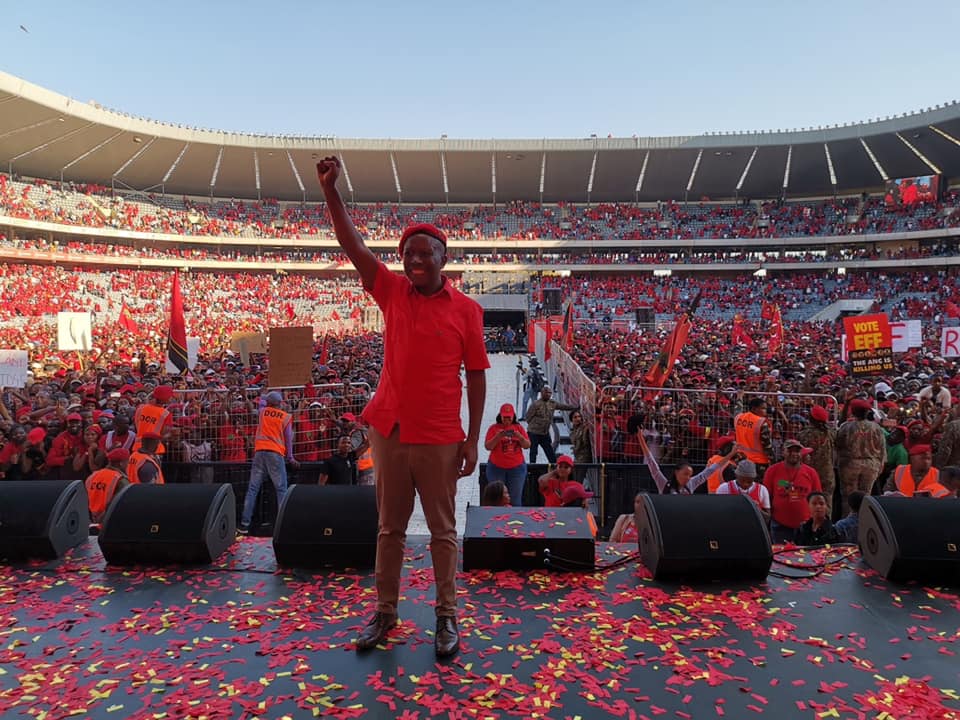Election results can provide an important barometer of the mood in society. The results of the Sixth National and Provincial elections on 8 May confirm that there is a deep ferment in South African society. The sharp drop in voter turnout, together with the high abstention from the election process, especially by the youth, meant that, for the first time ever, a minority of the voting-age population voted in the elections. This is highly significant in a country where the working class conquered the right to vote from the ruling class only 25 years ago.
Also for the first time, the ANC received less than 60 percent of the vote, with its share dropping from 62 percent in 2014 to 57.5 percent. It lost 19 seats to the Economic Freedom Fighters. As we have explained before, the lack of a second, trusted party of the ruling class meant that they are now stuck with the ANC. However, this is at the expense of draining the ANC’s authority over time. By doing this, all the responsibility for the crisis of South African capitalism and the resultant attacks on the working masses is placed on the shoulders of one party. This is laying the basis for a revolutionary crisis in the future.
The hopes of the ruling class to promote the liberal Democratic Alliance as a second party to take over from the ANC were dashed when support for the party declined by nearly half-a-million votes. The DA made a big song and dance about being the only party that has grown its voter support since the first elections in 1994. This time, they actually arrogantly aimed to get 30 percent of the vote. Instead, their level of support declined. The party is in a terminal crisis and could even fall apart in the coming period.
The Economic Freedom Fighters are the biggest winners in these elections. It is the only party that has grown in all the provinces. Its share of the vote grew by 69 percent since it was formed five years ago. It increased its support from 6.3 percent to 10.79 percent. The party has shown growth in the most unlikely places, from deep rural areas, to working-class neighbourhoods in the big metropolitan centres.
Frustration of the masses
The most important element underpinning these elections is the mood of demoralisation, in particular amongst the young, which represents the majority of the population. Only one generation after the democratic transition, the majority of the voting-age population have become so disillusioned with the system that they decided not to vote for one reason or another. This is not ‘apathy’ or the ‘normalisation’ of the ‘democratic process’, as some media analysts have called it. On the contrary, it shows a deep sense of frustration towards the system.
This is also reflected in the polarisation visible in the vote, with the Freedom Front Plus coming from the right to take away votes from the Democratic Alliance; and the Economic Freedom Fighters growing on the left wing.
Out of 26.7 million registered voters, 17.6 million, or 65.9 percent turned out to vote. That means that more than 9 million registered voters did not vote in the elections. That is a drop of 7.5 percent from five years ago. In addition to this, 9.2 million people did not register for the elections. Out of a voting-age population of 36 million people, for the first time, more than half - or 18.5 million (51.5 percent) - did not vote. Although the number of registered voters increased compared to 2014, nearly a million fewer people turned out to vote.
This mass abstention is not ‘voter apathy’. South Africa is a highly politically engaged society. At the same time as voter participation has dropped, the number of community protests has increased. Large layers of society are expressing themselves politically outside of the formal electoral process. This could be witnessed in the weeks before the elections, when the country was gripped by a spike of protests within the urban poor and township youth. These protests have reached record high levels each year since 2013.
Together with this, we have also seen the dramatic rise of student movements every year since 2015. The youth are the most politically active section of society but to a large extent are not expressing this in elections. Where they do participate in the voting process they are pushing up the vote of the EFF and when they are not voting, they are participating in mass protests. In other words, what we see is a radicalisation of the youth, which anticipates big events in the future.
Empty victory for the ANC
The ANC has had its worst performance ever. For the first time, it lost support in all the provinces of the country. It has gone from 249 seats in the National Assembly to 230, and is now governing the country with a mandate from only 28 percent of eligible voters. In Gauteng, the most important province, it only just managed to keep its majority, with 50.19 percent of the vote. Had it lost its majority in Gauteng, this would have been a big blow. In all the provinces there is a direct correlation between the losses of the ANC and the gains of the EFF. In the National Assembly, the 19 seats it lost went to the EFF.
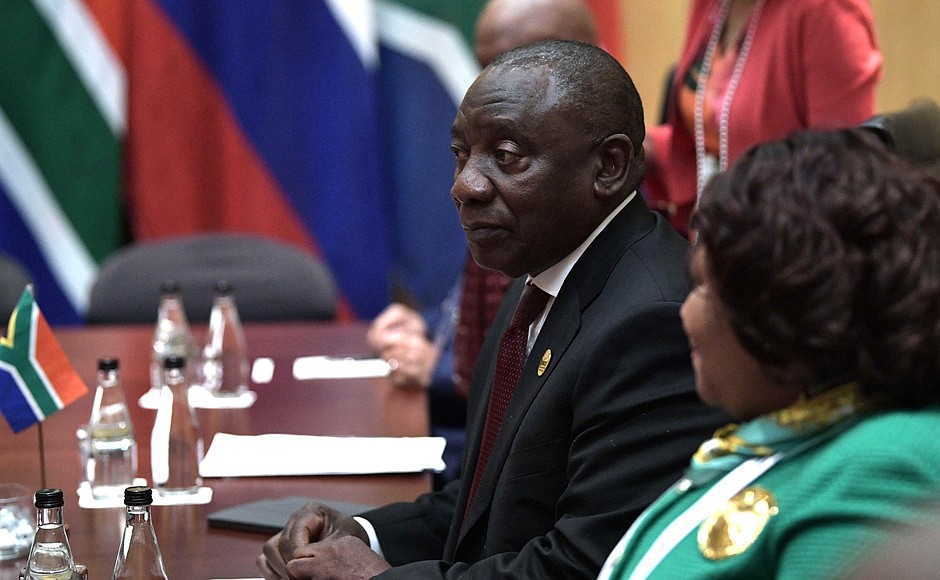 25 years of governing the country on a capitalist basis means that the ANC’s political capital is spent. This was its worst-ever performance in national elections / Image: Flickr, PoR
25 years of governing the country on a capitalist basis means that the ANC’s political capital is spent. This was its worst-ever performance in national elections / Image: Flickr, PoR
The ANC went into these elections battered and bruised. The factionalism and infighting were on full public display as the election day beckoned. Leading party members were openly defying leading bodies of the organisation. The controversy over the party’s lists to parliament and the provincial legislatures is the latest example of an organisation in decay. Frightened by the public backlash, the party’s Veterans League has gone so far as to call on persons implicated in corruption to withdraw themselves from the lists. Secretary-General Ace Magashule, who is running the party’s organisational affairs, accused his own government of bugging his phone and spying on him. After the results were released, Magashule was in a public spat with Fikile Mbalula, the party’s head of campaigns, over the impact of President Ramaphosa on the elections. All of this was happening in front of the world’s media at the result operation centre!
25 years of governing the country on a capitalist basis means that the ANC’s political capital is spent. The crisis of the capitalist system is tearing it apart. Its moral and political authority has reached an all-time low and is sinking by the day. Its prior ability to hold back the movement of the black masses is severely curtailed. On the contrary, by becoming part of the ruling class themselves, the ANC leaders are fast becoming the object of the rage of the masses. Dialectically, things have turned into their opposite.
The existential crisis of the DA
Despite the crisis of the ANC, and the myriad of scandals that have engulfed the ANC over the past five years, the main opposition party, the liberal DA, also lost support. It received below 21 percent of the vote nationally, dropping five seats in the National Assembly.
During the election campaign, the party posed itself as a “party for all South Africans”: a message that could not resonate in a society polarised by the class struggle. The workers are actually very class conscious and hate the big liberal capitalists, which are represented by the DA.
The party is also facing a serious crisis. It has run a disgusting campaign of bashing immigrants, xenophobia, fear mongering and hysteria in an attempt to hide its own problems. One of the reasons for this is that the Economic Freedom Fighters are breathing down their necks. The EFF has completely overshadowed the DA in parliament. But the biggest source of its crisis is its declining support in the Western Cape province. The Western Cape is the party’s main traditional base of support. It is the only province that is not governed by the ANC. But even here, the DA lost support, dropping its vote share from nearly 60 percent to 55 percent.
In the last 18 months, the party has also been rocked by a bitter internal struggle involving its former mayor in Cape Town, Patricia de Lille. This war resulted in De Lille breaking from the DA to form her own party. The crisis alienated a big section of the middle-class DA voter base. The result was that 30 percent of voters were undecided going into the elections. A big section of previous voters simply decided to abstain. This has had a big impact on the party’s support nationally. Its support has stagnated for several years and is now declining. A decline in support in the Western Cape means a lower number of seats in the National Assembly.
The decline of support for the DA could now speed up the breakup of the party. The DA is a product of different social layers, welded together after 1994. In the Western Cape, it came to power in 2009 by swallowing a number of smaller parties. In the process of governing on a capitalist programme, the DA alienated the supporters of these smaller parties. What we are witnessing now, is the beginning of a process of the fragmentation of this alliance.
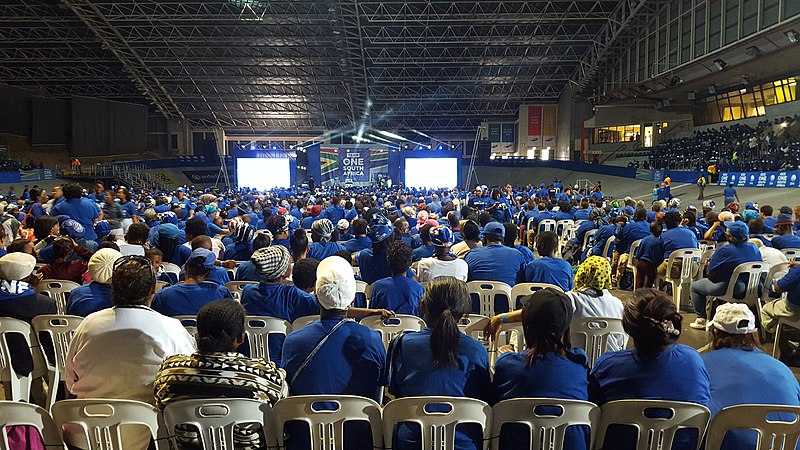 The bourgeoisie hoped the Democratic Alliance could be the second 'trusted party', but it lost ground in these elections / Image: Lefcentreright
The bourgeoisie hoped the Democratic Alliance could be the second 'trusted party', but it lost ground in these elections / Image: Lefcentreright
Originally, the DA base came from the liberal Democratic Party, which was the main opposition party to the National Party under the apartheid regime. When the National Party eventually disintegrated, it managed to step into the vacuum to attract the conservative Afrikaner vote. But this relationship between the English liberal bourgeois and Afrikaner petty-bourgeois nationalists has its own fraught history. Among a big minority section of Afrikaners, especially the farmers, there is still deep resentment over the two wars the groups fought in the past, as well as the loss of direct political power in 1994.
There is also a sense in these layers that the DA has not fought hard enough against attempts by the EFF to change the constitution to allow for land expropriation without compensation. They are also bitter that the past 25 years have disproportionately benefited big business ahead of the capitalist farmers. This explains the growth of the Freedom Front Plus, a right-wing Afrikaner nationalist party that has attracted a section of the DA’s conservative Afrikaner and white farmer support. The party has grown from 0.9 percent to 2.38 percent and slashed about 250,000 votes from the DA, giving it 10 MPs in the National Assembly.
At the same time, there is also a crisis in the liberal camp itself. A certain section reckoned that the only way to grow the DA is to absorb a layer of the black middle class within its leadership. But in doing this, the liberal base has kept firm control of the policy-making structures of the party. This caused serious friction in the party between the white liberals and its black middle-class members. A recent incident, where the party blocked the adoption of the Black Economic Empowerment policy, is a clear example of this. This has led to accusations of tokenism and that the party’s leader, Mmusi Maimane, does not have real authority in the party. Matters were not helped when an internal poll indicated that the former party leader, Helen Zille, is more popular than Maimane.
The fault lines within the party are widening, which could lead to a split or a series of splits in the coming period. Once this process takes off, it will be a serious blow to the illusions the ruling class might have of building a trusted liberal bourgeois opposition party. This is a peculiar crisis facing the South African bourgeoisie. In contrast to many other bourgeois democracies until recently, the ruling class of South Africa does not have a second party to shift power to. It means that they are stuck with the crisis-ridden ANC government. But this means that all the contradictions of the capitalist crisis will be concentrated in one party. While the lack of an alternative could mean that the ANC could continue to win elections, its authority is falling fast. Without an alternative party to act as a “safety valve” to channel the anger of the masses onto a safe road (from the point of view of the ruling class), this could prepare for explosive and revolutionary events in the future.
The continued rise of the EFF
The EFF is the only party that has grown in all the provinces of the country. It now has a clear national footprint. Campaigning on a slogan of “Our land and jobs now!”, the party received significant support in places it previously was not expected to, such as the Eastern Cape and Kwazulu-Natal.
Its growth in the rural provinces is clearly due to the land question. The EFF is the leading voice behind the process of amending the constitution to allow for the expropriation of land without compensation. In the socially conservative province of Kwazulu-Natal, which in the past has proved notoriously difficult to penetrate for new parties, its support grew remarkably from 1.9 percent in 2014 to nearly 10 percent in 2019. This has come at the expense of the ANC, which lost almost 10 percent. That is an additional 250,000 votes, which not so long ago would have seemed improbable. It is now the second-largest party in three provinces, Limpopo, Mpumalanga and the North West province.
However, the most significant fact is that the party is getting support from big working-class districts in the metropolitan areas. In Gauteng, the economic heartland of the country, the EFF received more votes than in any other province. It received 14.68 percent of the provincial vote, which is a significant number in an urban province with the biggest concentration of the working class in the country.
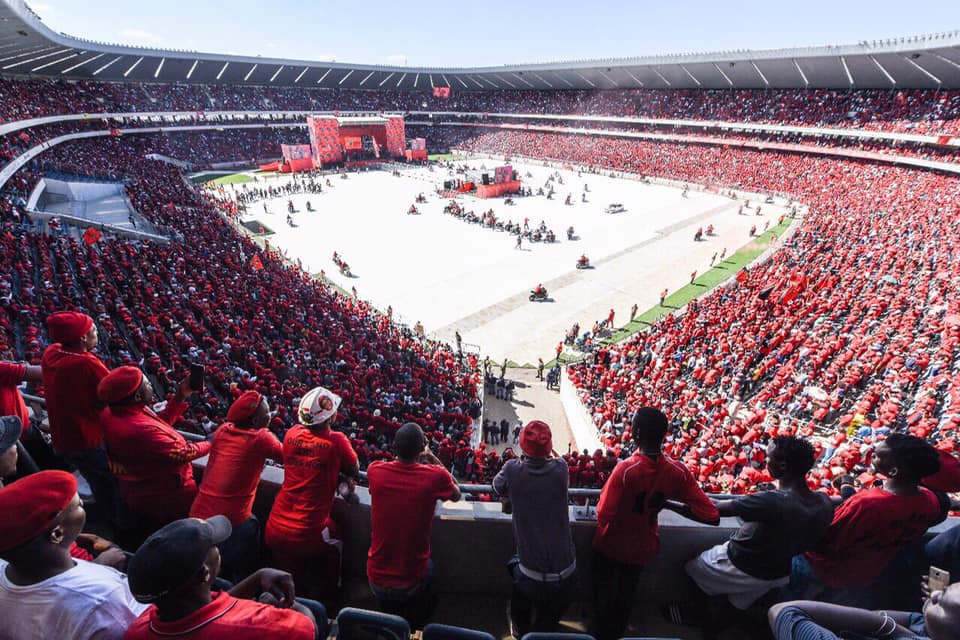 The EFF is the only party that has grown in all the provinces of the country / Image: EFF official FB
The EFF is the only party that has grown in all the provinces of the country / Image: EFF official FB
The EFF was participating in its second general elections since it was formed five years ago, when it received more than a million votes within six months of being formed. In the five years since then it has taken the political landscape by storm. Its 25 MPs have often set the tone and dominated the political debates by skillfully using the rules against the ANC. Its “pay back the money” campaign forced former president Zuma to refund some of the money that was looted and used at his private mansion in Nkandla. This eventually led to Zuma stepping down as president. It forced the ANC to begin the process of amending the constitution to allow for expropriation without compensation. The party also plays a leading role outside of parliament. For instance it pushed the Tshwane and Johannesburg city councils to insource its workers, resulting in job security and better conditions for thousands of workers. The EFF has been a leading force behind the student protests since 2015, which led to important victories for the student movement.
The EFF has a radical programme of land expropriation without compensation, nationalisation of banks, mines and other strategic sectors, free education, sanitation and housing, etc. These demands are clearly resonating with sections of the working class in the urban centres. There are of course shortcomings with this programme. In particular, the party aims to implement it without breaking with the capitalist system. Instead, it promotes the idea of building a ‘strong developmental’ state. That is, not to expropriate the capitalist class, but merely to regulate it and steer it via the state. But capitalism is essentially an anarchic system, which by its very nature cannot be regulated. The only way to solve the problem of the working masses of South Africa is by replacing the bourgeois state with a workers state and placing commanding heights of the economy under the democratic planning, control and management of the working class.
But the working class does not necessarily read the fine print on party programmes. The same is true of the land question. The concessions the party made to the ANC on the parliamentary motion on the question of expropriation has no meaning for the rural people who have voted for the EFF. All they see is that the party is fighting to deal with the land question (see a critique of the land question and the concessions made by the EFF). These layers are now moving to the EFF with raised expectations. This could have an impact on the character of the party, driving it further to the left.
The debacle of the workers’ party
Another significant result was that of the new Socialist Revolutionary Workers Party (SRWP), a party launched by the biggest trade union in South Africa, NUMSA. The new party did dismally in the elections, receiving a paltry 24,000 votes nationally, or 0.14 percent. This is a disastrous result and there should be no attempts to sugarcoat it. The honest members of NUMSA and activists of the SRWP who had high expectations for the party should be given answers. In a reply to the election results posted on its Facebook page, the SRWP offers no serious analysis or explanation of what happened. The statement says that the party is not shocked by the outcome of the elections. In other words, it's not shocked that a party formed by the biggest union in the country, with nearly 400,000 members, received only 24,000 votes! In the Eastern Cape, with a big concentration of vehicle assembly workers, the SRWP only received 4,807 votes, or 0.24 percent! In Gauteng, with its big working-class population, it received 0.13 percent! You would search in vain to find a single sentence in the official statement that offers any serious introspection. Instead, it proclaims the election result as a victory for the IMF and World Bank.
The roots of the SRWP lie in the split between NUMSA and COSATU in 2013. During the period between 2009-2014 there was a mass upsurge in the class struggle with a huge increase in strikes, demonstrations and protests as a response to the economic crisis. At that time, Numsa took a very clear and radical class position. This made it the focal point of the most class-conscious workers in South Africa. The split was mainly the result of the growing discontent of the advanced workers with the leadership of the ANC, which were supported by the right-wing labour leaders of COSATU.
At its special national congress in 2013, NUMSA broke with the ANC alliance. It formed a new trade union federation (SAFTU) and subsequently passed resolutions at successive congresses to form a workers’ party. During that, time this whole process was driven by the advanced workers. There was a deep ferment within the ranks. However, despite taking clear decisions, NUMSA’s leading bodies kept postponing the formation of the party every year for the last six years. At its 10th National Congress in 2016, the leadership decided to to take the issue to the Central Committee, where it remained in obscurity until it was announced that the party would be launched in December 2018. On this date, a decision was taken again to postpone the launch of the party until April 2019. This meant that the party was launched a mere four weeks before the elections, when NUMSA had six years to form it and get the message out.
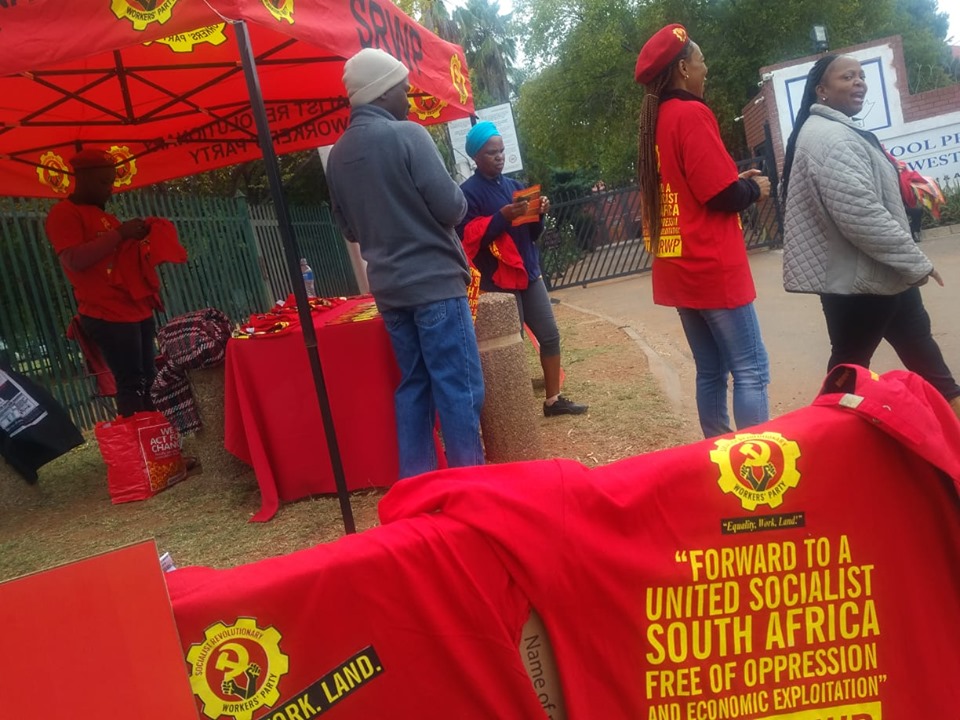 The new SRWP did dismally in the elections, receiving 24,000 votes nationally, or 0.14 percent. There has been no attempt from the leadership to explain this disastrous result / Image: SRWP official FB
The new SRWP did dismally in the elections, receiving 24,000 votes nationally, or 0.14 percent. There has been no attempt from the leadership to explain this disastrous result / Image: SRWP official FB
In the runup to the elections, there was no energetic, open, transparent and democratic campaign to even win over the ranks of SAFTU. In fact, just before the elections, SAFTU itself said that the federation has not even discussed the idea of giving its support to the workers’ party. This would suggest the NUMSA leaders had not raised the idea strongly with the ranks of SAFTU, despite playing a leading role in the union federation. In fact, the number of votes reveals that the NUMSA leaders did not even wage an energetic campaign within NUMSA itself! NUMSA’s ranks know how to mobilise the broader layers of the working class. Its organisational capacity, as well as its political authority among the workers are unmatched. Had the NUMSA leaders headed a focused, clear and energetic campaign based on the party’s socialist programme, they could have made a big impact in the elections.
The NUMSA and SRWP leaders should also have turned to the ranks of the EFF. The EFF and NUMSA came out of the same process of the class struggle between 2009-2013 and the splits in the tripartite alliance. But while the EFF took THE initiative and boldly moved forward, the NUMSA leaders prevaricated and procrastinated. If the NUMSA leading members had the same approach, the entire situation would have been different. Instead, they waited to launch the party at the most inopportune time, where the working class movement in general is going through a temporary ebb. In the past, NUMSA has made some valid criticisms of the EFF, primarily regarding its ambivalence towards a clear socialist position. But since then, the union has not actually tried to demonstrate this in practice.
The NUMSA leaders have downplayed the election result by calling elections a mere “tactic”, equal to other tactical decisions, to gain the ear of the workers. As Marxists, we agree that participation in elections is a tactical tool, although a very powerful one, to reach the widest layers of the working class. But NUMSA didn’t achieve this at all. NUMSA has hundreds of thousands of members, which have mobilised millions of workers over the years. When it was in the ANC-led alliance, the union was a leading force behind campaigns, which gave the ANC a two-thirds majority in parliament. But this time there was no such campaign. There is a serious need for the NUMSA rank-and-file and SRWP activists to do a proper analysis and draw a necessary balance sheet of this whole process. This could have been a significant moment for the class struggle in South Africa. The NUMSA leaders had a historical opportunity of using the elections to build the first real independent working-class party of South Africa, but they failed.
The major struggle ahead is to unite the working class in the streets, factories, mines and shop floors. There is a huge vacuum on the left, which must be filled one way or another. The rise of the EFF indicates a shift to the left within the working class.
On a capitalist basis there is a bleak future for the workers, youth and poor people of South Africa. Capitalism is the reason for this crisis. The establishment of bourgeois democracy was a major advance for the working class. But formal democracy cannot solve the problems of housing, unemployment, and poverty. Only by mobilising the working class and the youth in order to expropriate the wealth of the exploiters, the capitalists, can these problems begin to be solved.

